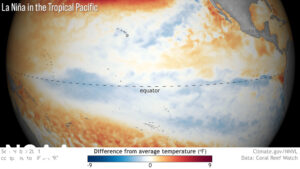
La Niña refers to a departure from normal in the sea-surface temperature across much of the eastern tropical Pacific Ocean.
The water temperatures off the west coast of South America are typically 60 to 70 degrees. During a La Niña these waters get as much as 7 degrees colder than normal. La Niña conditions recur every few years and last nine to 12 months, though some events have lingered for as many as two years. This cooling results from a strengthening of the winds over the tropical Pacific and its interaction with the underlying ocean waters.
A La Niña event developed in the tropical Pacific in August-September 2020 and ended in May 2021. La Niña conditions have emerged for 2021, the second winter in a row.
Wisconsin winters tend to have more precipitation and near-average temperatures during a typical La Niña.
The National Oceanic and Atmospheric Administration’s (NOAA’s) seasonal outlooks provide the likelihood that temperatures and total precipitation amounts will be above, near or below average.
La Niña are important events to this seasonal outlook, which does not project seasonal snowfall accumulations as snow forecasts are generally not predictable more than a week in advance. NOAA’s 2021 winter outlook (December 2021 through February 2022) predicts wetter-than-average conditions across portions of the northern U.S., primarily in the Pacific Northwest, northern Rockies, Great Lakes, Ohio Valley and western Alaska. Drier-than-average conditions are favored in south-central Alaska, Southern California, the Southwest and the Southeast.
Above-average temperatures are favored across the South and most of the eastern U.S. Below-average temperatures are favored for southeastern Alaska and the Pacific Northwest eastward to the northern Plains. The Upper Mississippi Valley region has equal chances for temperatures at below, near or above average.
Steve Ackerman and Jonathan Martin, professors in the UW-Madison department of atmospheric and oceanic sciences, are guests on WHA radio (970 AM) at 11:45 a.m. the last Monday of each month. Send them your questions at stevea@ssec.wisc.edu or jemarti1@wisc.edu.

